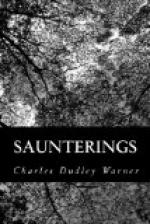The great day of the fete was Sunday, October 5 for on that day the king went out to the fair-ground, and distributed the prizes to the owners of the best horses, and, as they appeared to me, of the most ugly-colored bulls. The city was literally crowded with peasants and country people; the churches were full all the morning with devout masses, which poured into the waiting beer-houses afterward with equal zeal. By twelve o’clock, the city began to empty itself upon the Theresien meadow; and long before the time for the king to arrive —two o’clock—there were acres of people waiting for the performance to begin. The terraced bank, of which I have spoken, was taken possession of early, and held by a solid mass of people; while the fair-ground proper was packed with a swaying concourse, densest near the royal pavilion, which was erected immediately on the race-course, and opposite the bank.
At one o’clock the grand stand opposite to the royal one is taken possession of by a regiment band and by invited guests. All the space, except the race-course, is, by this time, packed with people, who watch the red and white gate at the head of the course with growing impatience. It opens to let in a regiment of infantry, which marches in and takes position. It swings, every now and then, for a solitary horseman, who gallops down the line in all the pride of mounted civic dignity, to the disgust of the crowd; or to let in a carriage, with some overdressed officer or splendid minister, who is entitled to a place in the royal pavilion. It is a people’ fete, and the civic officers enjoy one day of conspicuous glory. Now a majestic person in gold lace is set down; and now one in a scarlet coat, as beautiful as a flamingo. These driblets of splendor only




